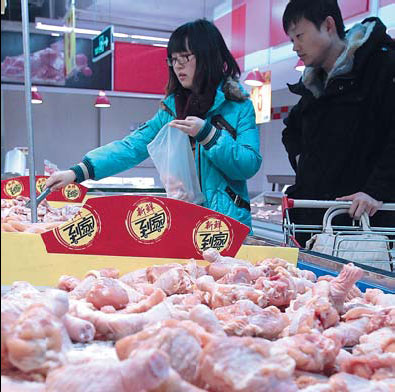Rising health concerns over rapid development of chicks, report He Na, Yang Wanli and Shi Baoyin.
Sun Xin never cooks. Her heavy workload means she always eats out or orders takeout, and the 25-year-old IT engineer in Zhongguancun, Beijing, has been a loyal consumer of KFC products since her student days.
Convenience and 24-hour opening are two of the reasons for her loyalty, but more important, she said she had always trusted the multinational brand, believing that it is able to guarantee the safety of its food.
 |
|
Health concerns over chicken meat have grown following recent media reports. Wang Jing / China Daily |
However, recently she has called the hotline a number of times, but has hung up before the call was answered. She hasn't eaten the company's products for days.
Zhang Xiufang, a native of Shanxi province who has been selling chickens and related produce at Yuandadu Tianlihong market in Beijing's Chaoyang district for many years, said that sales have recently suffered a sharp downturn.
"Generally, the New Year holiday and weekend are peak seasons for us, but the situation has changed. Half the meat I prepared to sell each day remains in storage. Customers would rather spend 10 yuan ($1.60) more per kilogram to buy free-range chicken," said Zhang anxiously.
In Nanshan Wholesale Poultry Market, the largest in Shenzhen, Guangdong province, sales of broiler chickens have dropped like a stone recently, while sales of free-range birds have risen sharply. With a daily sales volume of 60,000, free-range chickens account for more than 70 percent of the daily total.
The change has occurred following recent media reports of high levels of antibiotics and illegal growth hormones in "Instant Chickens" at some farms in the provinces of Shanxi and Shandong, the main production areas. Instant Chicken is the nickname given to birds that grow rapidly, from chicks to ready-to-eat meat in just 45 days.
On Dec 18, China Central Television reported that some poultry farmers in Shandong had given their chickens excessive amounts of antibiotics to help them survive in overcrowded coops. The report claimed international corporations such as KFC and McDonalds were supplied by these farms.
|
Antibiotics: friend or foe? |
|
Antibiotics have been used on poultry since the 1940s to prevent and treat diseases, although some experts contend that this poses risks to humans as bacterial strains can develop stronger resistance to the drugs. While one of the positive side effects is that antibiotics can promote growth, the downside is that they can lead to serious problems, including damage to internal organs and disorders associated with resistance to disease. China News Agency recently reported that the country produces roughly 210,000 tons of antibiotics annually, with nearly 50 percent used on poultry and in aquaculture. Several years ago, the US Congress rejected a proposed bill to make the use of antibiotics in animal feed legal only for therapeutic use. The rejection was based on scientific claims that slaughtered chickens may harbor pathogenic bacteria, which can be passed on to humans. In October 2000, the US Food and Drug Administration discovered that two antibiotics were no longer effective in treating diseases found in factory-farmed chickens and both were subsequently pulled from the market. To prevent any residue in chicken flesh, birds that have given antibiotics are required to be withdrawn from the production process for a specified period before they can be slaughtered. Yang Wanli |
Statements from KFC and McDonalds stressed that chicken used in their outlets conforms to the current safety standards and that food safety is one of their primary concerns.
While the fast food companies have come under the media spotlight, shares in poultry companies have tanked since the reports and a large number of chicken farms in Shandong and Shanxi have been ordered to halt production while the Ministry of Agriculture conducts investigations.
The ministry has pledged that the results will be released when the investigations have been completed and that checks on poultry farms will be upgraded, especially those for excessive use of antibiotics.
The impact of the allegations has been great for a number of reasons: First, because chicken is a staple of Chinese dining tables; and second, because it appears to be yet another in a series of food safety scares that have battered the confidence of Chinese consumers in recent years.
Food safety scandals
The problem of food safety is a hot topic in China. The list of recent scares is long, ranging from milk contaminated with melamine, to pork containing high amounts of illegally added thin carnosine; fake salty duck eggs, where food colorants had been added to produce red yolks; illegally recycled cooking oil; and vegetables with residual levels of pesticides well above the legal limits.
"It is one of the most popular topics under discussion currently. Actually, I have no idea how long it takes for chickens to be ready for slaughter, but 45 days is still short enough to scare me away from not only KFC, but also all food containing chicken," said Sun.
